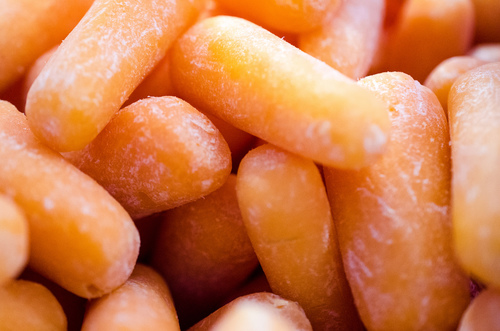Short answer
Baby carrots are not bad for you. While they are treated with chlorine to disinfect them before packaging, the levels used are very low - comparable to that of tap water. They are then further rinsed to get rid of any chlorine remaining on the surface.
Recommended Alternative
Long answer
You may have seen an article or read on a health-food blog that baby carrots are bad for you. The claim is generally that baby carrots are made from "deformed" carrots which are subsequently whittled down and soaked in chlorine. The chlorine is presented as a deadly and toxic additive that does damage to your body and kills off the good bacteria in your gut.
None of that is quite true. Baby carrots aren't made from "deformed" carrots: they're made from normal carrots, which are sorted by length and mechanically stripped of their skin. Federal law mandates that ready-to-eat vegetables like baby carrots be disinfected before packaging. So the carrots are misted or rinsed with a solution that contains very low levels of chlorine - comparable to the levels of chlorine in tap water, which varies by region but is generally insignificant. The chlorine solution is washed from the carrots before they're packaged.
At no point are the carrots "soaked" in chlorine, and there's not much evidence that they absorb significant levels of chlorine during the disinfection process. Chlorine has been used safely for decades to disinfect public water supplies and different kinds of food. There's very little evidence that it wreaks havoc on the bacteria in your gut, calcifies your pineal gland, or causes other damage to your body. What is dangerous is the chance of contracting bacteria like e. Coli or MRSA from food which has not been properly disinfected; such an infection can cause severe sickness or death and will require treatment by aggressive antibiotics that will wipe out the bacteria in your gut.
And the white film that forms on baby carrots? It's a natural process - the dehydration of surfaces on the carrot which have been cut. Because the entire skin of a baby carrot has been cut, it manifests the white film. The same would be true of a carrot from the garden that you sliced in half and left out. This "white blush" isn't caused by chlorine - there's actually some evidence that chlorine slows the process by which white carrots develop a blush.
What's more: baby carrots seem to be good for you. They've got relatively low levels of sugar compared to other vegetables and blunt the effects of sugar with a healthy dose of fiber. Carrots are also a good source of Vitamin A, which your body uses a number of different ways. Baby carrots aren't quite as nutritious as whole carrots - the skin that's stripped away in their production is where many of the nutrients in carrots are stored. They're not dangerous, however, and they still do a lot of good for your diet.
Ingredients to be aware of
- trace amounts of chlorine

Benefits
- low levels of sugar
- great source of fiber
- great source of vitamin a
- promotes eye health
- promotes skin health
- antioxidant properties
Our Wellness Pick (what is this?)
Le Sueur Baby Carrots
- Tender baby whole
- Rich in nutrients
- Convenient 6-pack
- No added preservatives
 Approved by
Approved by 









.png)





